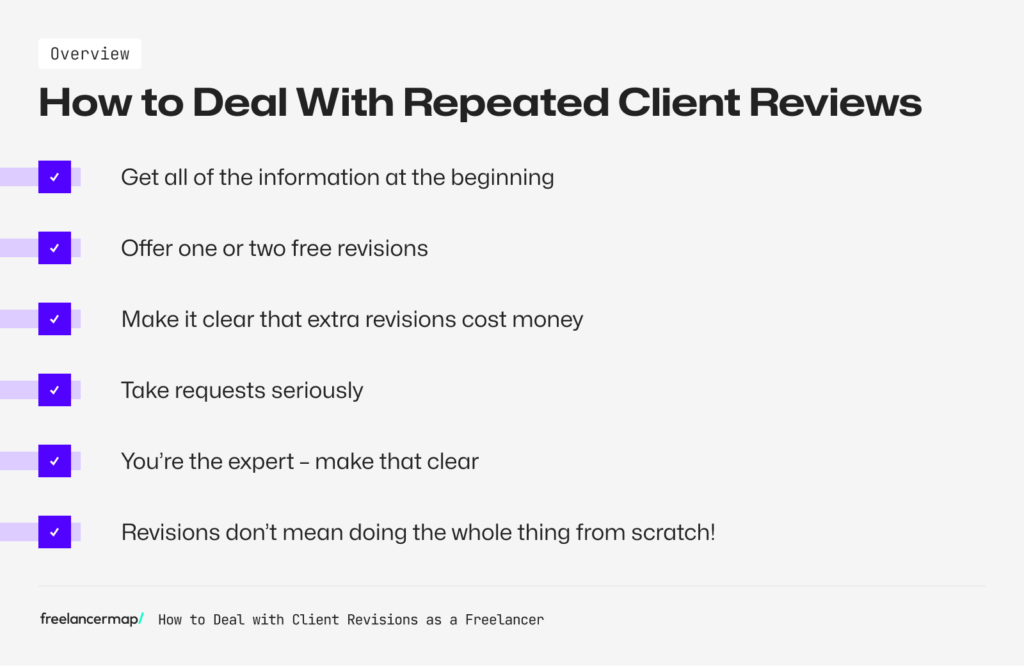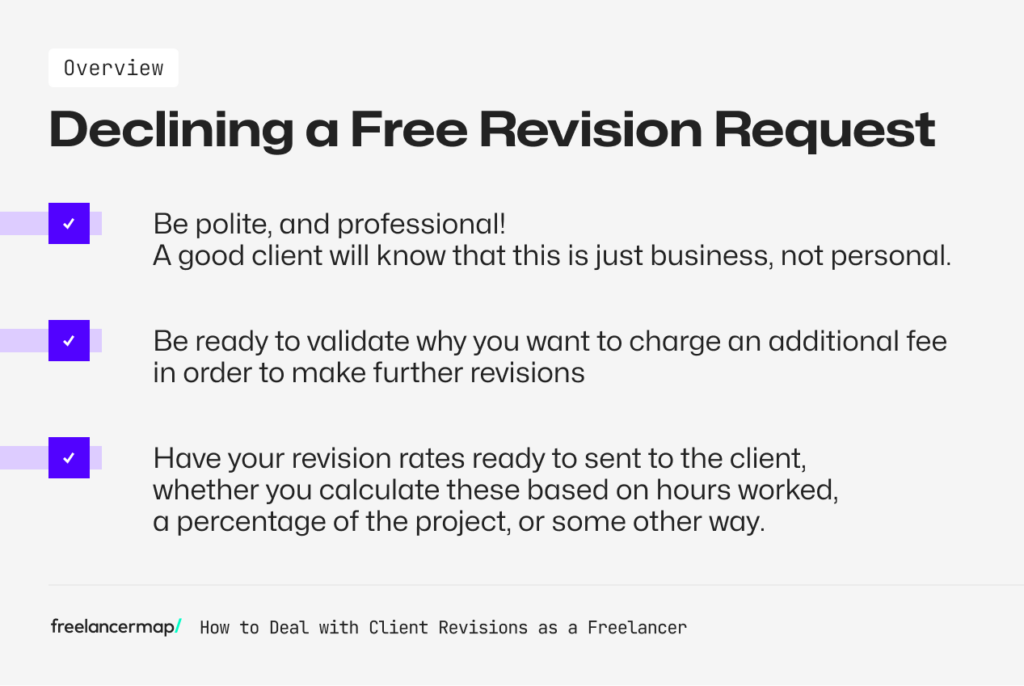One of the most frustrating challenges for many freelancers is dealing with repeated client requests for revisions on a project. This is a factor you need to be prepared to deal with on a regular basis – so check out our tips to dealing with client revisions properly.
Out of all the challenges freelancers face daily, none are as irritating as a client constantly asking for changes to something you’ve already agreed upon.
“I really like the work, but can we change this and that?”
“Could you please add X?”
“I would really appreciate it if you can do an extra paragraph about subject Y!”
Regardless of what industry you work in, clients requesting revisions an inseparable part of freelancer life. That is why, instead of just getting upset with them and grinding your teeth through the extra work, you should have a specific strategy for dealing with client revisions.
Join our freelancer community today!
Create your profile in just 2 minutes and start attracting new clients.
Tips on Dealing with Client Revisions and Reviews

1. Get all of the information at the beginning
First and foremost, as the saying goes – an ounce of prevention can be better than a pound of cure. To avoid clients asking for endless revisions, make sure you truly understand what they expect from you. That can be more difficult than it sounds.
Your client is not an expert in what you’re doing – that’s why you got hired in the first place. So you will have to be the person asking the important questions.
Don’t miss: Tips for better client communication
In many fields, it will make sense to have a pre-made list of questions ready for your clients. That will help you understand what you’re doing.
Splitting your project into multiple steps and enticing client feedback for each step can further help that process. But be wary of spending more time on feedback than actual work.

2. Offer one or two free revisions
Revisions are not something that you should reject straight away. Misunderstandings happen, plans, and goals change. And as long as it’s not all that drastic, making some minor changes to a product is usually not that much work.
Offering one or two free revisions, depending on your market and what you’re comfortable with, will do a couple of things. Firstly, the client will be aware that each further revision costs money. Secondly, that will force them to be more careful and thorough with their requests.
When a client knows they only get one free revision, they will do their best to give good feedback. Otherwise, it can drag on until infinity.
3. Make it clear that extra revisions cost money
Endless work is not really a problem – as long as it comes with endless pay. That is why each revision after the initial ones you offer for free should have a price tag. Determine that price right away and include it in your freelancer contract as a revision fee clause. A good way to calculate this would be an hourly rate and an estimate of how much the revision will take you.
4. Take requests seriously
One of the ways to make sure there are no endless revisions is to take your client feedback as seriously as you can. Does that sound counter-productive? It might, but it really isn’t.
When you really pay attention to what your client wants, you will be able to solve the initial problems before they turn into a downward spiral of everyone being unhappy with the work.
Yes, the taste is subjective, and you might think you know better – in fact, you probably do. But take your clients seriously.
Read more: Tips to deal with unsatisfied clients

5. You’re the expert – make that clear
Taking feedback professionally doesn’t mean budging to everything the client deems necessary. In fact, it means quite the opposite. Client-freelancer relationships aren’t a one-way street. You, the freelancer, are also responsible for giving honest and detailed feedback. If something the client wants doesn’t work, tell them it doesn’t, but also explain why that might be the case.
You were hired for your expertise, so make sure you show it. As a freelancer, you will have the responsibility to judge what is necessary and what isn’t.
6. Revisions don’t mean doing the whole thing from scratch!
Last but not least, there will also be the clients that expect you to do so many revisions that you end up throwing out all of your initial work. Vague requests are a huge red flag for that kind of behavior. When that happens, you really only have one sensible choice – try to wrap up the project as neatly as you possibly can without wasting your time and never look back again.
Clients that try to micromanage you and look over your shoulder for every little detail can’t always be avoided. But if you tried everything from the five points above and they’re still requesting constant changes, it’s not really your fault. In that case, saying no to the client and their revision is likely the right decision.
How to Politely Decline Free Revisions
There will be some cases where you will not be able to do a free revision for a client. Perhaps they’ve asked for revisions one too many times – or perhaps the revision request is too big a project for you to undertake for free.
Regardless, approaching this subject with your client can be a difficult situation. You don’t want to upset your client and risk hurting your working relationship, but you do need to be clear and firm on the way you work.
A few examples of emails politely declining a free revision could look something like this:
Dear Client,
Thank you for your email. I would be happy to add the additional revisions/features to the project, but I should make you aware that this does fall outside of the brief upon which we originally agreed.
Would you be available to discuss negotiating an additional fee to compensate for the time spent on these further revisions?
Many thanks,
The freelancer
Another example for letting the client know that extra work costs more could look like this:
Dear Client,
Thank you for your feedback on the project I recently submitted for review, and for the revisions, you have sent back to me.
I estimate these further revisions to take another X hours, and for this reason, I will need to add a further charge for the project to compensate for the additional time required and for the complexity of the revisions.
Please let me know a good time to discuss this further with you.
Best,
The freelancer
The key things to remember when declining a free revision request are:

Prevent Client Revisions instead of Dealing with them
Of course, the best way of dealing with client revisions is by preventing these requests from happening in the first place.
So here is how to do it:
Communication and Confirmation
Client revisions are all about communication. At the beginning of a project, you should be defining the project goals and what exactly the client wants.
Once you’ve done this, sending over a quick summary of all the essential points you have gathered need doing in the project to the client for final approval is a great way of having any last-minute changes addressed, as well as providing a clear brief that you can refer to if any later revisions fall outside of this.
This is why writing a proposal or an order confirmation, will help you to confirm that you and your client are on the same page.
Have a Contract Signed
Another way of preventing client requests for review (or at least, unsolicited requests for free work) is to make your conditions clear in the contract you agree with your client before you begin working.
As we’ve mentioned above, you may be happy to include one or two free revisions in the project before you begin charging – but you should make this clear in your contract, as well as the extent of those free revisions – i.e. one or two tweaks, not re-doing the entire thing.
How do you deal with scope creep in the form of constant revision requests? Share your worst client experiences and how you got around them in the comments below!

